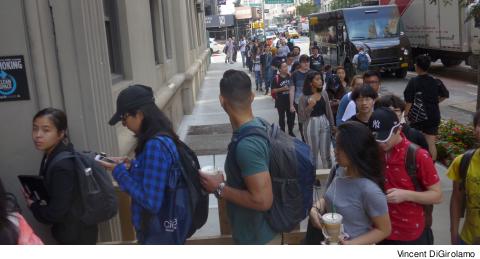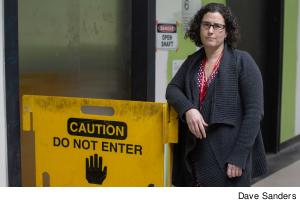PSC targets safety concerns at Baruch bldg.
 |
Imagine coming to campus, wondering if you will need a face mask to walk through the hallways or whether or not you will make it to class on time because the elevators – the few that are even working – are too crowded. There is constant construction. Drilling and pounding pierce the air. Classrooms are turned into makeshift laboratories, and the heat is either barely working or working overtime.
According to faculty, staff and student accounts, these conditions could be the story of any day at 17 Lexington Avenue, a Baruch College building used by thousands that houses the Department of Natural Sciences, 60 classrooms, eight computer labs and 19 science labs.
“You just don’t know what you’re going to walk into. There’s this changing scene of interruptions that you don’t know how to prepare for,” said Rebecca Spokony, an associate professor of natural sciences who has worked in the building for the past five years. “Three days a week there’s going to be something disruptive. Sometimes it is constant, and sometimes it is intermittent.”
 |
ADMIN SHRUGS
What’s the response from the campus administration? Not much. After months of complaints from the union, PSC members say there is still no comprehensive plan from the college to notify faculty, staff and students about changes in building conditions resulting from ongoing construction and maintenance work. It shows an indifference by administrators to the dangers of poor health conditions and the effects of construction on student learning and faculty research.
“Timely notices are emailed to the faculty, students and staff who work and learn in the building to announce upcoming major changes to operational issues so they can plan ahead,” according to a statement from a Baruch College spokesperson. The college also conducts periodic walkthroughs of the building to identify and report any health and safety concerns, and there is a protocol in place for faculty and staff to report any health and safety issues. But the measures are not enough.
Last year, PSC Baruch Chapter Chair Vincent DiGirolamo, who works in the building, received only four emails addressed to the campus community about the renovations. Two of the emails came after major inconveniences with the heat and the elevators already occurred; the other two addressed broad concerns around the construction and were both sent on February 13, 2018, ten days after he wrote a letter to campus administration outlining concerns.
Working in the building, according to PSC member accounts, is like playing a game of whack-a-mole. “It’s elevators one day. It’s air quality another,” said DiGirolamo, who thinks the decision to have people work in a building during major renovation should be revisited. “You can endure a lot for the short term, but the short term is endless.”
The historic building at 17 Lexington was constructed in 1928 and stands on the original site of The Free Academy. PSC members who talked to Clarion do not dispute that 17 Lexington needs to be renovated. In 2017 Baruch officially broke ground on a multiyear, six-phase renovation project that will ultimately modernize the elevators, install new chillers, boilers and a cooling tower and reconfigure one entrance so natural light spills in. Baruch College President Mitchel B. Wallerstein called the renovation “long-awaited.”
But the plan, according to documents obtained by Clarion, does not factor in the needs of a growing department of natural sciences. Science faculty from other colleges conducted an external review of Baruch’s department of natural sciences at the end of the Spring 2018 semester. The review notes that both teaching and research space for the department will decrease significantly under the “out of date” renovation plan, and thus does not meet the needs of students or faculty for one of the college’s largest majors. The renovation was first envisioned in 2008, and college officials say, future planning for labs and teaching spaces will involve faculty and department input.
A LONG PROCESS
The renovation is currently in “Phase 1a” and the remaining phases are awaiting New York State funding under the CUNY proposed capital budget. The future phases, according to college officials, will be tailored to the amount of funding available. The renovations will continue for a number of years, but should not, PSC members said, continue at the cost of faculty, staff and students’ work, health and safety. At least three PSC members have reported asthma and respiratory problems that worsen when they are at work, and some junior faculty worry about achieving tenure because the renovation work interferes with research experiments and, when the power goes out, endangers expensive reagents that need to be refrigerated. Spokony said the constant construction makes working in the building “miserable” and for students learning is a daily challenge.
Baruch freshman Joe Ades, a real estate major, was stuck in an elevator for 10 minutes. Once, he waited 30 minutes for an elevator, and another time, because of a late elevator, he walked down seven flights of stairs despite recent knee surgery. Cameron Hart, a senior in management of musical enterprise, uses his cellphone as a hotspot to access electronic textbooks because there is often no working wireless internet in the building.
Brian Michalak, a senior in biology, attends his physics class in a “makeshift lab” with no working sink. The professor, he said, comes to class with a bucket of “disgusting” and “murky and dusty” water when they have to do certain experiments. The construction noise, he said, is constant too. “It’s New York City, you’re used to a lot of ambient sound…a lot of drilling and knocking and loud crashing sounds,” Michalak said. Students complain about things informally, but they’re pretty much resigned to how things are, he said. “Ha ha, it’s Baruch.”
The PSC chapter at Baruch has been working to address members’ concerns. In March and August of 2018, the PSC Health and Safety Watchdogs conducted walk-throughs to document the issues. The chapter has written letters and discussed the problems at labor-management meetings. With that pressure, the chapter has secured some improvements, including an additional maintenance person to try to control the dust and a “guarantee that all contractors are in compliance with health and safety laws,” according to DiGirolamo.
DiGirolamo told Clarion: “Staff and faculty who work in the building, including myself, have started meeting so we can speak with one voice about what needs to be done. These problems cannot be addressed simply by hanging ‘Excuse Our Dust’ signs in the hallways.”
When the electricity was out, faculty members were forced to meet with students in the dark. The fourth, sixth and seventh floors have no women’s restrooms, and at one point, the fifth floor women’s restroom had only one working toilet. Some windows are nailed shut. In a dissection lab, the vapors linger inside – some students leave the room because of their burning eyes; some faculty have stopped doing dissections. Once, because of inadequate funding, a dead mouse remained in the wall and the odor as it rotted affected the adjacent rooms. Another time, the main bus bar in an electrical box was left open where someone could have been shocked or killed if they came in contact with it. The conditions are “unsafe” and “unacceptable,” and the faculty are developing a plan to hold the college accountable.
PSC members report concerns to the college’s environmental health and safety director, James Kazsnosky, who faculty acknowledge, is responsive but responsible for the entire campus and limited in what he can do. Rather than having to report problems as they arise, faculty and staff said that they want some more proactive steps from the administration and efforts to prevent predictable problems.
We need a plan “Our members shouldn’t be working in buildings that are undergoing extensive renovation like 17 Lexington. It’s dirty and dangerous,” said Jean Grassman, PSC Health and Safety Watchdogs co-chair. “Before a single hammer is lifted, the administration needs to develop a plan to ensure that the project will be done safely and that there are lines of communication in place so that problems can be responded to promptly.
Grassman told Clarion that because of the complicated nature of the renovation, there are many contractors working in the building on a rotating basis. As a result, the ever-changing workforce is unfamiliar with the needs of the people working in the building and problems recur.
“The administration’s attitude is, ‘You tell us when there’s a problem.’ This approach is reactive and non-productive,” Grassman said.
The administration has begun to move some labs to places with less construction, according to PSC chapter officials. Air filters have been put in place in the hallways. Sometimes there is advance warning when the power or water will be shut off, but there are no advance warnings when there will be large accumulations of dust. While there is some communication about the ongoing construction, PSC members said that they generally do not know what to expect – day to day, week to week, semester to semester. With this uncertainty, they do their best to proceed with work, design their courses and apply for grants.
“It’s CUNY, and I’m not expecting it to be fancy, but I’m not expecting [my workplace] to be a health risk that I’m supposed to assess myself and sort of ‘use at your own risk,’” said Spokony, who is committed to teaching at a public university. “I want to be here, so I can do my research and my students can do their research. Every single day, I have to say to myself, ‘Why am I doing this to myself?’”

